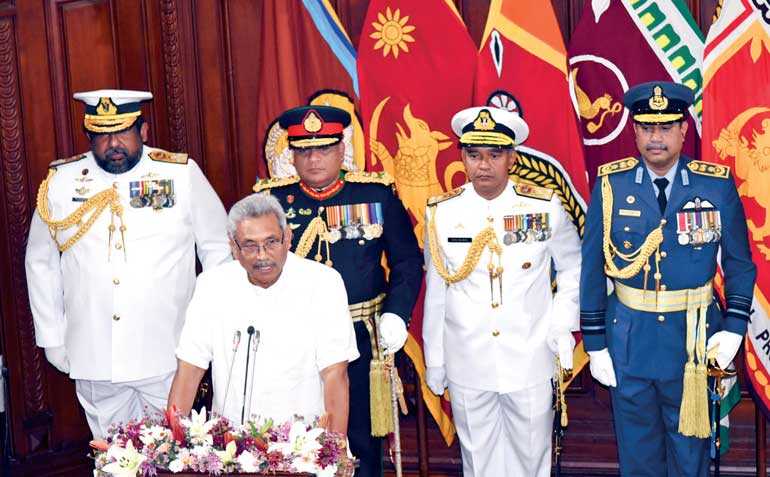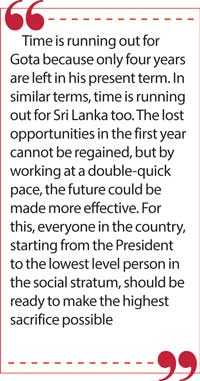Saturday Feb 21, 2026
Saturday Feb 21, 2026
Monday, 16 November 2020 00:30 - - {{hitsCtrl.values.hits}}

Sri Lanka is at war today and it is Gota’s Third War. But it is not his war alone; it is our war too. We all should fight it with vigour, rigour, perseverance, and determination. The whole nation should help Gota by working harder, two or three times harder than before, to take the country out of the present economic malaise. That is the only source of progress. Without that, the Budget 2021 will only be another document with no practical relevance
Gota’s Third War is the most challenging one
The Government led by President Gotabaya Rajapaksa, fondly called Gota, is to present its maiden Budget to Parliament tomorrow. The Budget will cover the Government’s financial plan for 2021, one  year after Gota was elected President of the Republic.
year after Gota was elected President of the Republic.
His Prime Minister and Finance Minister, Mahinda Rajapaksa, presented an Appropriation Act for 2020 to Parliament last week. It was only a regularisation of the four Votes on Account approved by the Executive earlier in the year for sanctioning expenditure out of the Consolidated Fund and an increase in the borrowing limits of the Government. The revenue side of the Government has not been tackled there. Thus, the Budget proper will come only tomorrow.
Hence, from the economy’s point, the first 12 months were a waste. Gota inherited an ailing economy and was required to introduce a quick action plan to put it back on the right track. Instead, he was firefighting all the time, intervening at micro levels and postponing the much-needed macrolevel economic reforms. He has now come to terms with reality that cannot be ignored anymore. Hence, the Budget 2021 should lay foundation for redirecting the economy for realising the immediate, short, medium, and long-term goals of the nation. It is a war to be fought with vigour, rigour, and tenacity.
That war is Gota’s Third War, the first two being the defeat of LTTE in the first decade and securing political power in the second decade of 2000s. Though he won the first two wars easily, the same cannot be said about the third war to be fought in the third decade of the century. That is because the stakes are so adverse that it is the most difficult and challenging war which he has to fight today. If he makes a mistake here, it is irrecoverable, and Sri Lanka will be destined to remain a lower middle-income country forever.
The economy which Gota inherited has been suffering from a multitude of ailments.
Slowing economic growth
Economic growth has been slowing down since 2013. Immediately after the end of the war in 2009, there was a boost in economic activities raising growth above 8% in the immediately-following three-year period. But the country could not sustain this high growth after 2013 due to the domestic economy-based economic development policy that was adopted by the Mahinda Rajapaksa administration.
After 2015, the previous Yahapalana Government which also inherited a sick economy failed to make a turnaround. Accordingly, in 2019, the growth rate receded to 2.3% thereby compelling the World Bank Group to downgrade the country from a higher middle-income country to a lower middle-income country in mid-2020. This debacle fell on the country just one year after it was elevated to higher middle-income country status.
COVID-19 pandemic economic debacle
Following this declining trend, in the first quarter of 2020, the economy shrank by 1.6% when Gota was engaged in firefighting and making unrelated micro-level interventions. Then, delivering a double jeopardy, the country was hit by disastrous COVID-19 pandemic, forcing Gota to lockdown the economy for three long months.
This led international multilateral lending institutions like IMF, World Bank and ADB to project a negative growth of 5-7% for Sri Lanka in 2020. However, the country’s Central Bank predicted an economic expansion of 1.7% in 2020 when it released its Annual Report for 2019 in April 2020. This has now been converted to an economic shrinkage of 1.7% by the bank when it came out with the pre-budget economic development report in November this year.
However, the Ministry of Finance, as revealed in the Appropriation Act presented to Parliament last week, has gone by the IMF’s forecast for Sri Lanka for 2020 that places economic growth at negative 4.3% for the year.
None of these predictions could be verified since the Department of Census and Statistics or DCS also failed to observe the timeline of its advance release calendar for releasing GDP data in terms of the undertaking it gave to the IMF when the country went for the Special Data Dissemination Standards or SDDS some four years ago.
With a second wave of COVID-19 pandemic attacking the country in October and its sheer ferocity and quick spread throughout the country, it is now projected that economic recovery will be prolonged and growth will be around a negative 7% in 2020. This negative growth is to continue till about 2023 despite the optimistic projections made by the Central Bank. This is bad news for Gota because his first term ends in 2024.
Critical external front
On the external front, the country faces two critical issues. One is the need for mobilising foreign exchange resources to meet the debt-servicing obligations-work involved in repayment of debt and payment of interest-arising from the total country external debt made up of both the Government and the private sector. The other is the critical balance of payments or BOP situation that has worsened due to the dwindling of the foreign exchange earnings through normal sources.
Both will exert pressure on the exchange rate to depreciate in the market. Gota is not responsible for either one. He has simply inherited them, but it is his duty now to take measures to correct them.
Sri Lanka, the notorious saver
Sri Lanka’s external debt problem has been festering for more than three decades now. A country which is filled with aspirations for becoming a nation of worth has been a notorious consumer, generating inadequate savings domestically for meeting the high investment requirement to reach that goal. Worse, its government has been a dis-saver, spending more on consumption than what it earns simply to live only today by satisfying various pressure groups and thereby foregoing the future. From 1988, this has been the common feature in Sri Lanka’s budgetary operations.
The result has been to eat up a part of private savings, reducing the total national savings available for investment. During 1988-2019, Sri Lanka’s national savings on average have been 22% of GDP. But its average investments during this period has been 27%. The resultant savings-investment gap of 5% has been funded by borrowing from abroad or by using the savings made by foreigners. But it has increased the country’s debt stock year after year, increasing the amount of resources that have to be used for servicing this debt.
Since the Government did not have sufficient resources to do so, maturing debt and payment of interest on all the debt has been met by further borrowing. This is the debt trap in which Sri Lanka has been caught. This chronic problem which has now become acute is menacingly knocking at Gota’s door.
The acute foreign debt problem
Today, the debt problem, elevated to an acute level, can explode at any time. The country must find resources to meet debt obligations of both the Government and the private sector. According to Central Bank data, within the next 12-month period, the total debt servicing obligations of the country that include those of both the Government and the private sector will amount to $ 6.7 billion. But the liquid foreign exchange which the country has as foreign reserves amounts to $ 5.4 billion after excluding the gold balance which cannot be used immediately for this purpose. In addition, the Government’s foreign debt servicing obligations in the next five years will be about $ 4.2 billion per annum.
Sri Lanka is now debt-ridden and a debtor who is unable to meet his debt obligations cannot have the same luxurious life which he had earlier. Sri Lankans have been enjoying a good life by borrowing and consuming today and passing the burden of debt servicing to their children and grandchildren. This cannot go on forever without imploding from within.
Though Sri Lankans hate austerity, known in common usage as belt-tightening, there is no other solution available now. It is like a diabetic who has enjoyed sugary foods all the time coming to terms with the reality he faces. Thus, it requires the whole country to make the hardest sacrifice today. This sacrifice should be across the board from the President at the top to the common man in the street at the bottom based on one’s ability. Gota’s challenge is to make this happen through his maiden budget for 2021.
Weakened budgetary situation
It is the fiscal front on which Gota is worst hit. Government revenue plus grants have been declining steadily as a ratio of GDP from around 22% in 1995 to its lowest at 13% in 2019. With the generous tax concessions extended by his Government in early 2020 as a supply-side incentive package, the revenue base of the Government is to fall to about 9% of GDP in this year.
During the first seven months of 2020, tax revenue is down by Rs. 274 billion compared to the achievement in the corresponding period in 2019. In the balance five months, it will be worse because of the second wave attack of COVID-19 pandemic and curtailment of imports leading to a reduction in both revenue from import duties and the corresponding low revenue in Value Added Taxes.
But his expenditure bill, especially on consumption, is higher than before. Government dis-savings will reach a staggering 8% this year and the overall budget deficit more than 10% of GDP. The attainments so far in disciplining the Budget and making it more macroeconomic compliant will have to be thrown out of the window.
Hence, year 2020 is a write-off from a budgetary perspective. Hence, Budget 2021 should lay the foundation for regaining what has now been lost. It would essentially involve the abandonment of the generous tax concessions offered early in 2020 and going for the previous strategy of revenue-based budgetary consolidation on one side, and placing a firm cap on the consumption expenditure bill on the other. What this means is that offering Government jobs to unemployed graduates and children of Samurdhi beneficiary families, for example, will be an unaffordable luxury in the years to come.
Gota’s promises that have gone disarray
Gota had grand economic plans for the country, as revealed in his manifesto presented to the electorate in November 2019. Economic growth was to be elevated to 6.5% per annum during 2020 to 2024. This is an improvement on the average economic growth of 4.2% during the post-independence period. With this growth, he had expected to increase the average income of a citizen, called per capita income, to $ 6500 by 2024. This would have enabled Sri Lanka to reach the mid-level of an upper middle-income country in that year.
But with a low economic growth of 2.3% in 2019, projected negative growth in 2020 and the prolonged economic recovery that would be extended till 2024, the achievement of this goal appears to be a formidable challenge. It is difficult but not impossible provided his Government adopts correct strategies immediately and stick on to them consistently.
He also had three other targets which have now become virtually impossible due to the economic disruption from COVID-19 pandemic hitting the country in multiple waves. One was to keep the inflation rate below 5%. Another was to maintain unemployment below 4%. The third was to bring the budget deficit down to 5% of GDP. All these goals have been derailed by the onset of COVID-19 pandemic on one side, and the Government’s inactivity for one year on the other. In addition, he had planned to stabilise the exchange rate and maintain a lending rate below 9%. Both these goals have become moving goals for Sri Lanka today.
Development institutions are yet to be established
To manage the economy, according to his manifesto, several new institutions were also to be established. Of them, the most prominent one was the establishment of a National Policy and Planning Commission or NPPC under the chairmanship of the President. Even after one year, there is no sign of establishing this commission.
Another important institution to be set up was the National Enterprise Authority or NEA to reform the loss-making or inefficiently-run State enterprises. Since Gota’s policy has been to keep State ownership of even the loss-making and inefficient enterprises, the intention here was to reform them under Government leadership. So far, this too has not been done and because of COVID-19 economic disruptions, the losses in key enterprises have escalated to unaffordable levels.
He also promised to improve the competency of Government officers by providing them with training and making them competent in ICT. Once the competency levels of Government employees have been brought up to the required level, it has also been proposed to remunerate them according to a system of market-based salaries. This is a must and should be supported. But to attain the best results, he should reallocate budgetary resources to improve public service by cutting expenditure in non-priority or inessential areas.
Lee Kuan Yew: Progress depends on work and not on slogans
Time is running out for Gota because only four years are left in his present term. In similar terms, time is running out for Sri Lanka too. The lost opportunities in the first year cannot be regained, but by working at a double-quick pace, the future could be made more effective. For this, everyone in the country, starting from the President to the lowest level person in the social stratum, should be ready to make the highest sacrifice possible.
Today’s Sri Lanka is like Japan after the World War II. The destructive war and atomic bombs crippled its economy completely, but within a decade, by working hard, the Japanese showed the entire world that a nation could still emerge as the winner.
In this context, what Lee Kuan Yew had said in his parting press meeting after completing an official visit to the Soviet Union in 1970, as reported by ex-Singapore President S.R. Nathan in his autobiography, ‘An Unexpected Journey,’ is relevant to modern day Sri Lanka. Not satisfied with what communism had delivered to that country, Lee had told the press, obviously to the dismay of his hosts: “Many countries think that by calling themselves socialist or communist there is progress. That is not so. One has got to work. That is the beginning of progress.”
Does this mean that Sri Lanka should drop the appellations ‘Democratic’ and ‘Socialist’ from its name and work hard for earning both these qualifications? This is because Sri Lanka was ranked mid-level at 69 in the London-based EIU’s Global Democracy Index out of 167 countries in 2019. Throughout the post-independence period, its income distribution has not been the ideal with a Gini coefficient close to 0.5, a level far from being socialist.
It is a war of the whole nation
Sri Lanka is at war today and it is Gota’s Third War. But it is not his war alone; it is our war too. We all should fight it with vigour, rigour, perseverance, and determination. The whole nation should help Gota by working harder, two or three times harder than before, to take the country out of the present economic malaise. That is the only source of progress. Without that, the Budget 2021 will only be another document with no practical relevance.
(The writer, a former Deputy Governor of the Central Bank of Sri Lanka, can be reached at [email protected].)